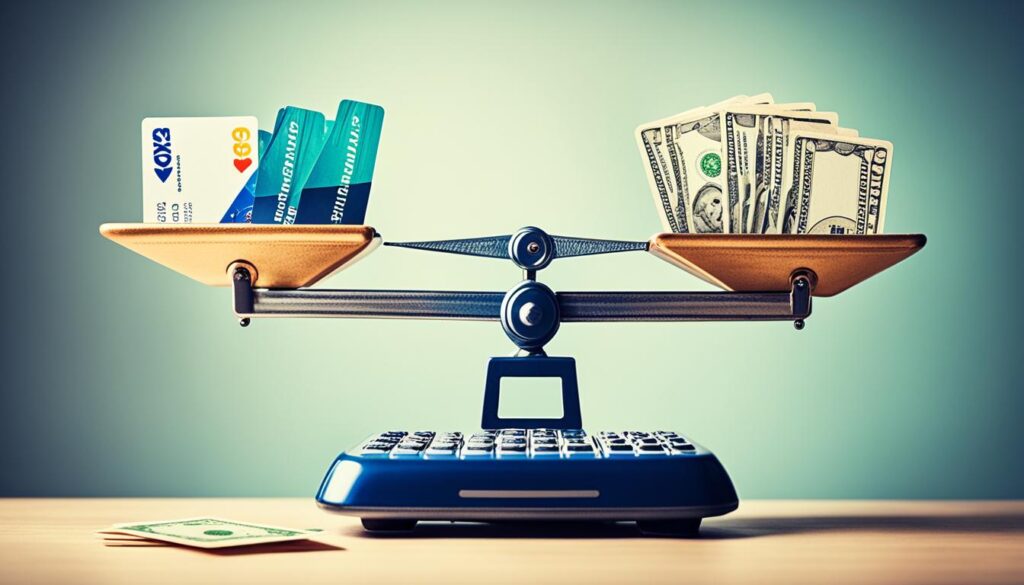Did you know that 64% of Americans are missing out on hundreds in savings account interest due to poor financial management1? This statistic sheds light on a pressing dilemma many face: Should I save or pay off debt first? Understanding the balance between savings and debt repayment is essential for long-term financial health.
Making informed decisions about financial priorities can significantly influence your overall stability. For instance, the average annual percentage yield on a credit card exceeds 20%, illustrating the costly nature of unpaid debts1. By addressing the intricacies of this topic, you can discover strategies that align with your specific goals and circumstances. This article will explore the critical question of prioritizing between debt management and saving, guiding you in building a solid financial foundation.
Key Takeaways
- Many Americans are unaware of missed savings opportunities.
- The costs of high-interest debt can impact long-term financial health.
- Understanding your financial priorities is key to achieving stability.
- Strategies vary based on individual circumstances and goals.
- Establishing a clear plan can help you navigate savings and debt management.
The Dilemma of Saving vs. Debt Repayment
The current financial landscape presents individuals with a significant challenge: deciding between savings vs debt repayment. This dilemma is central to effective debt management and directly influences financial priorities. Establishing a balance between saving and paying off debts can lead to better financial health, especially amid rising inflation and unexpected expenses.
Understanding the Balance Between the Two
Finding the right equilibrium between savings and debt repayment is essential for reducing financial stress. A notable percentage of U.S. adults attribute their credit card debt to unexpected expenses, with 43% citing such circumstances as the reason for their debt each month2. Meanwhile, an alarming 36% reported that their credit card debt exceeds their emergency savings2. Strategies to tackle high-interest debt while simultaneously building savings are critical in this balancing act. For many, prioritizing financial literacy can make a considerable difference in managing these competing interests.
Why This Decision Matters for Your Financial Health
The repercussions of neglecting either savings or debt repayment can severely impact overall financial stability. For instance, 89% of respondents feel the need for emergency savings sufficient to cover three months of expenses to feel secure2. A lack of emergency funds can lead individuals to go further into debt, with nearly half of families unable to cover a $400 emergency3. Furthermore, 57% of cardholders with lower incomes carry credit card debt, compared to 38% of those earning higher incomes, stressing the need for tailored management strategies2. Prioritizing debt management while simultaneously fostering savings creates a foundation for lasting financial health and prepares individuals for future uncertainties.

Should I save or pay off debt first?
Deciding whether to save or pay off debt first involves evaluating multiple factors that influence your financial situation. Each person’s circumstances differ, so it’s crucial to understand the implications of both saving and debt repayment. A popular hybrid approach involves the 50/30/20 rule, where individuals allocate 50% of their income to essential bills, 30% to discretionary spending, and 20% to savings and debt repayment4.
Factors to Consider When Making Your Decision
One significant factor is the type and amount of debt owed. High-interest debts, particularly credit card balances, can lead to substantial interest costs, motivating many to prioritize repayment over savings4. For instance, the average credit card interest rate reached 20.09% in February 2023, a sharp increase from the previous year, illustrating the growing costs associated with carrying balances5. Conversely, focusing on saving can foster financial security by establishing an emergency fund, which allows individuals to cover unexpected expenses without resorting to credit4.
Assessing Your Debt and Savings Goals
It is essential to assess your current debt situation and your savings goals. Recognizing your debt balances and understanding your monthly budget can help guide effective debt payoff strategies. Financial calculators may be helpful in determining whether to funnel extra money into debt repayments or savings based on your balances, annual percentage rates (APRs), and annual percentage yields (APYs)6. Experts suggest that having emergency savings totaling $200 to $500, or enough to cover three to six months’ worth of expenses, can significantly enhance your financial well-being5. By evaluating these components, you can establish a practical plan to manage a balance between saving and paying off debt efficiently.

Debt Management Strategies to Consider
Implementing effective debt management strategies is vital to achieving financial stability. Understanding the various methods available can help you devise a practical plan to tackle debt efficiently. This section discusses popular approaches, including the Avalanche and Snowball methods, along with an overview of when debt consolidation might be beneficial.
The Avalanche and Snowball Methods Explained
The Avalanche Method is a strategy focusing on high-interest debts first. By prioritizing these debts, you minimize overall interest payments. On the other hand, the Snowball Method enables you to pay off smaller debts first, providing early wins that can boost motivation. Both methods are viable debt payoff strategies that cater to different psychological and financial needs.
When Debt Consolidation Might Be a Good Option
Debt consolidation options can be advantageous for individuals struggling with multiple high-interest debts. This approach involves combining these debts into a single loan, potentially with a lower interest rate. For example, individuals with an average credit card rate of 21.59% might find relief by consolidating their debt into a manageable payment structure7. Not only can this simplify payments, but it can also provide psychological relief. However, it is crucial to avoid accruing additional credit card debt after consolidation to maintain financial progress8. Evaluating your debt situation carefully will help determine the best strategy for long-term success.
The Importance of an Emergency Fund
Establishing an emergency fund is critical for maintaining financial stability. It acts as a financial cushion that can cover unforeseen expenses, preventing new debt from accruing when emergencies arise. Understanding the difference in priorities between an emergency fund vs debt repayment enables individuals to navigate their financial journeys more effectively.
What is an Emergency Fund and Why You Need It
An emergency fund is designated savings set aside to cover unexpected costs, such as medical emergencies or urgent home repairs. Financial experts recommend saving enough to cover three to six months’ worth of expenses, as about 30% of adults indicated they could not cover three months of expenses by any means according to the Federal Reserve9. Having this safety net is vital, especially for those actively working to pay off debt, as it promotes prudent financial habits while minimizing the risk of falling back into debt due to unexpected costs.
How Much Should You Save for Unexpected Expenses?
Determining the right amount to save involves assessing one’s monthly expenses and committing to a savings strategy. Generally, about 20% of income should be allocated towards savings10. A high-yield savings account is ideal for storing an emergency fund, as it allows your savings to grow through interest and provides easy access when needed10. Creating a budget is essential to this process, serving as a tool to analyze income and spending habits, which is a crucial step toward building a robust emergency fund10.
Making Savings a Part of Your Financial Plan
Integrating savings into your financial plan is essential, especially when managing existing debt. By setting realistic savings goals, you can create a balanced approach that addresses both your need to pay off debt and the necessity of saving for future contingencies. Experts recommend that an emergency fund should ideally cover three to six months’ worth of essential living expenses11. For instance, if your monthly take-home pay is $5,000, aim for at least $15,000 to be well-prepared for unexpected expenses11.
Setting Realistic Savings Goals While Paying Off Debt
Finding a way to save while managing debt may seem challenging, but it is certainly achievable. Implementing the 50/30/20 budgeting method can be a practical strategy, where you dedicate 20% of your income to savings, including debt repayments12. By identifying unnecessary expenditures and redirecting those funds to your savings, you can gradually build a safety net. Additionally, consider exploring side hustles or other income streams, which can contribute significantly to both your savings and debt repayment efforts.
Tips for Saving Money Effectively
Effective saving often necessitates discipline and strategy. Make sure to prioritize high-interest debts while also carving out a portion of your budget for savings12. Utilize techniques such as the debt snowball or avalanche methods to streamline your payments while being consistent in your savings contributions. With a solid foundation in savings alongside debt management strategies, you set yourself up to navigate your financial future with confidence and stability.
FAQ
Should I save or pay off debt first?
What are effective debt payoff strategies?
How important is having an emergency fund when paying off debt?
What is the best way to balance savings and debt repayment?
How do interest rates impact my decision to save or pay off debt?
Can I still save money while paying off debt?
What should I consider before using debt consolidation options?
Why is it important to assess my debt and savings goals?
Source Links
- https://www.cnet.com/personal-finance/banking/savings/should-i-save-money-or-pay-off-debt-first/
- https://www.bankrate.com/banking/savings/these-guidelines-will-help-you-decide-whether-to-pay-down-debt-or-save/
- https://eringobler.com/pay-off-debt-or-save-money/
- https://www.cbsnews.com/news/should-i-save-money-or-pay-off-debt-first/
- https://www.experian.com/blogs/ask-experian/should-i-save-or-pay-off-debt/
- https://www.huntington.com/learn/saving/pay-off-debt-or-save
- https://www.investopedia.com/financial-edge/0212/saving-vs.-paying-off-debt.aspx
- https://www.tiaa.org/public/learn/retirement-planning-and-beyond/managing-your-money/seven-steps-to-more-effectively-manage-and-reduce-your-debt
- https://www.discover.com/personal-loans/resources/consolidate-debt/successfully-payoff-debt-build-emergency-fund/
- https://www.lendingtree.com/debt-consolidation/emergency-fund-or-pay-off-debt/
- https://www.forbes.com/advisor/banking/saving-vs-paying-down-debt/
- https://www.equifax.com/personal/education/debt-management/articles/-/learn/paying-off-debt-strategies/

